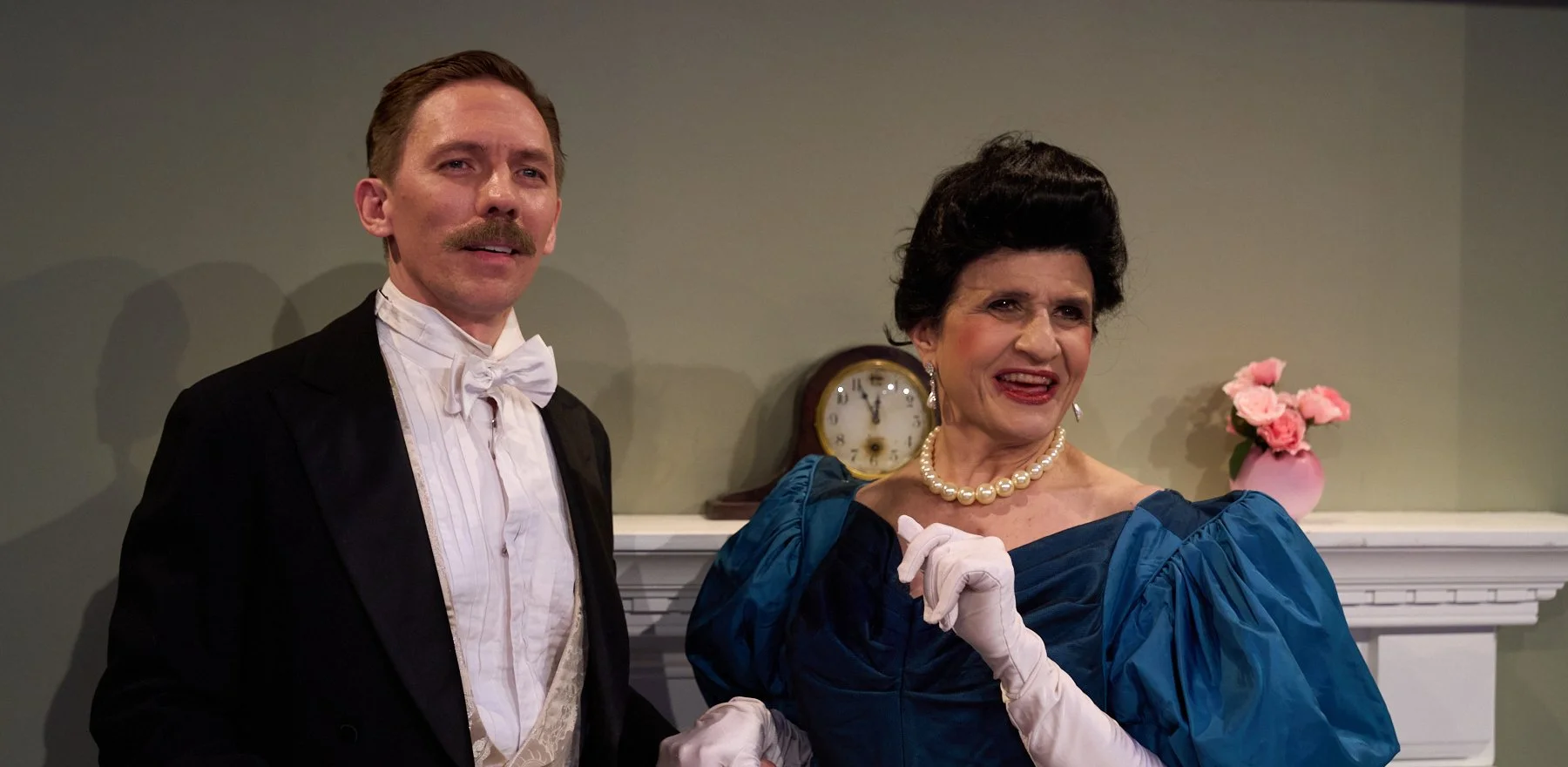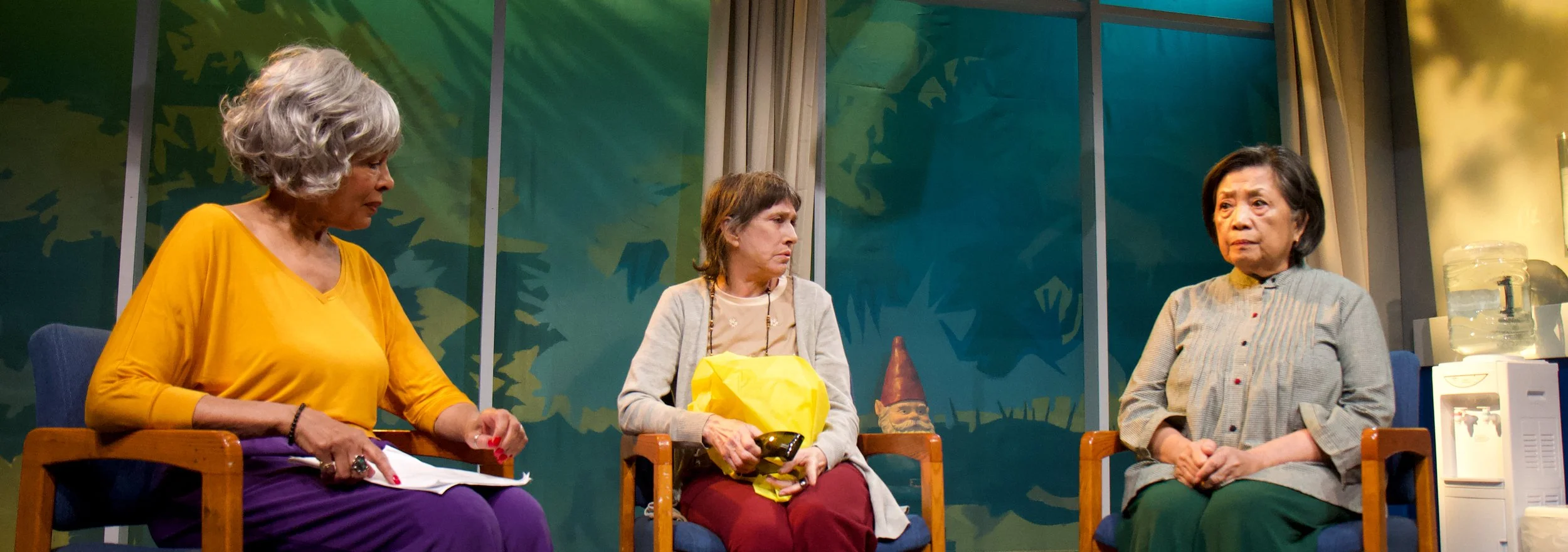Not Nobody, written by Brian Dykstra, is a play about ethics and the legal system. Under the direction of Margaret Perry, the work centers on McAlester Daly (Dykstra himself), a former ethics professor. One evening, he is out walking when a couple of cops—Officer Ricketts (Sheffield Chastain, who deftly plays a wide range of characters) and Officer Chavana (Kathiamarice Lopez, who brings a crispness to every role she plays)—stop him. He’s in a neighborhood where a middle-aged white guy typically wouldn’t be, and the cops find that odd.
Everything Is Here
Peggy Stafford’s Everything Is Here explores the later stage of the life cycle—what some call the golden years, and others call the twilight years—by focusing on three women in their 70s: Bev (Jan Leslie Harding), Bonnie (Petronia Paley) and Janice (Mia Katigbak). Living in senior housing, they find their days are punctuated by the visiting nurse, Nikki (Suzannah Millonzi), who has a sadness beneath her cheerful demeanor, and the lanky and handsome Grant (Pete Simpson), who leads meditation and mindfulness classes at the home while he auditions for acting roles.
Wake
Grief is very personal, and everyone processes it in their own way and in their own time. Elisabeth Kübler-Ross identified five stages of grief: denial, anger, bargaining, depression, and acceptance. Wake, written by Leon Ingulsbrud and Brooke Shilling, explores the contours of these stages through music, dialogue, musings, reflections, and poetry.
The Wasp
In Morgan Lloyd Malcolm’s The Wasp, two women—Carla (Amy Forsyth) and Heather (Colby Minifie)—meet at an outdoor café. Carla arrives first. Heavily pregnant, she lights a cigarette and, even seated, has a swagger about her. When Heather enters and sees Carla, she launches into nervous small talk, which Carla swats away with silence. The initial tension seems to stem from Carla’s dour and angry demeanor, but as the play unfolds, the core conflict revolves around their shared past, future consequences, and a morally difficult proposition.
Awake and Sing!
Sea Dog Theater’s 90th-anniversary production of Clifford Odets’s Awake and Sing! features a multiracial cast that makes the Depression-era drama feel contemporary and highlights the universality of the play’s themes. Set in the 1930s, the play focuses on the Bergers, a Jewish family who live in one room in an apartment in the Bronx, and the impact of economic hardship, unfulfilled dreams, and the tension between idealism and survival.
The Other Americans
John Leguizamo’s The Other Americans, now playing at the Public Theater, depicts not a melting pot of cultures, all successfully rising to the top, but rather the isolation and obstacles of the immigrant’s reach for a piece of the American pie.
At the Barricades
At the Barricades, a play drawn from original sources by James Clements and Sam Hood Adrian, explores the price of freedom and the complexities of political idealism. The play highlights the fight of the Abraham Lincoln Brigade, a battalion of international volunteers numbering roughly 2,800 Americans who fought on the side of the Republicans (the democratically elected government) during the Spanish Civil War (1936–39) against the Nationalists, the rising fascist dictatorship under Generalissimo Francisco Franco.
Wounded
Wounded, by Jiggs Burgess, is both gritty and warm. Digging into dark subjects such as alcoholism, drunk driving, co-dependent relationships, the alienation of being gay in a small town, and sexual assault, the play also shows how, in the face of adversity, humanity still shines through in some people.
Blind Runner
Blind Runner, written and directed by Amir Reza Koohestani, features only two actors. Set in Iran, the play is about a husband (Mohammed Reza Hosseinzadeh) and wife (Ainaz Azarhoush) who now only meet during prison visiting hours. Neither has an actual name. Wife is serving a sentence for something she posted on social media. Although it’s not specific, there is a suggestion she showed support for women who protested the 2022 killing of Mahsa Amini by the Guidance Patrol, a type of morality police. The post alters the lives of the couple.
The Blood Quilt
In The Blood Quilt by Katori Hall, four half-sisters gather a few weeks after their mother’s funeral for an annual rite of stitching a quilt. As they congregate in their childhood home, the quartet of archetypal characters rehash old conflicts with their different personalities and views of tradition.
Empire
Empire, a musical about the building of the Empire State Building—has a lot of heart. Set in three time periods—1929, 1930, and 1976—the story moves back and forth between Sylvie Lee (Julia Louise Hosack) and Mohawk Grandmother (April Ortiz) in the 1970s and the character of Frances Belle (Kaitlyn Davidson), a.k.a. “Wally,” a firecracker of a woman who is classy in pants, working her magic in a man’s world in the 1920s and ’30s, as the iconic skyscraper is being built.
Here There Are Blueberries
Here There Are Blueberries, a 2024 Pulitzer Prize finalist by Moisés Kaufman and Amanda Gronich, explores the idea that a picture can speak a thousand words. The play has been created using “historical artifact, interviews conducted with real people, historical transcripts, and other primary sources.” Centered on an album of photos that was meant to be destroyed, the play asks whether the side of those who commit atrocities in history should also be shown.
Philadelphia, Here I Come!
Philadelphia, Here I Come, written in the 1960s by Irish playwright Brian Friel, poignantly captures the anticipation, fear, and excitement of emigrating to a new place. Set on the eve of departure, Friel’s play focuses on Gar, the would-be émigré, in both his Public self (played with subdued melancholy by David McElwee) as he struggles with his decision to leave, and his Private self (played with exuberance by A.J. Shively), screaming to get out. It’s deadly boring in Ballybeg, a tiny little corner of County Donegal, Ireland, where the most exciting things are a game of checkers and memories of teenage shenanigans.
Fish
The broken pieces of public education are laid bare in Fish, a world premiere drama by Kia Corthron presented by the Keen Company. Set in an unnamed high school, the play captures the ails of urban education, the poverty-stricken neighborhoods in which they sit, and the resulting challenges students experience as they try to keep their heads above water.
The Fall
Amsterdam’s red-light district, circa 1956. A man walks into a bar and chews on the question: What does it mean to fall from grace? And, as a man who is having a few drinks in a bar and talking to strangers, he will ask many more questions, sometimes personal and often philosophical. In The Fall, by Albert Camus, a French philosopher who won the Nobel Prize in Literature in 1957 and is considered the father of existentialism, the man in the bar is Jean-Baptiste Clamence, a former Parisian lawyer who has himself fallen from grace.
Richard III
In William Shakespeare’s Richard III, the title character is a hunchback whose anger is fueled because he feels like an outcast. His quest for power becomes a form of revenge. Under Robert O’Hara’s direction, Richard III for the Public Theater is loose and playful. Actress Danai Gurira, in the gender-swapped title role, is sinewy and tiger-like. As Richard, she pounces, manipulates, smiles, grins, and grimaces: a shape-shifter who manipulates others.
Take Shape
Mime is a silent art of storytelling that requires great physical expressiveness. It is often associated with street performers, but Broken Box Mime’s Take Shape sets a new paradigm for the art form: mime as performance for the theater. Eight vignettes range in themes from global warming to cooking and parenting. There are no props, stage design or costume changes. All the stories in Take Shape are conveyed through the highly physicalized art of pantomime.
Incantata
Incantata, by Pulitzer Prize–winning Irish poet Paul Muldoon, is an elegy crafted into a theatrical narrative that loosely weaves together erudite poetic imagery and concrete memories with literary and artistic references. The experience is a journey through bumpy waters, a sensory and linguistic adventure with Stanley Townsend, a tremendously talented and physical actor, at the helm of the solo show.
Blues for an Alabama Sky
Blues for an Alabama Sky, by Pearl Michelle Cleage, has been around for 25 years, but only now has the Keen Company given it a New York debut. Still, Cleage’s work, about black artists struggling in 1930, during the Harlem Renaissance, is as relevant today as it was a quarter-century ago. Poverty, discrimination, abortion rights, violence, and the everyday hustle to make it are still real issues in 2020.
Novenas for a Lost Hospital
Novenas for a Lost Hospital is a memory play told through several narrators that celebrates St. Vincent’s Hospital, a Catholic charitable hospital in the West Village that was founded in 1849 and closed in 2010. The novenas (devotional prayers in Catholicism), of which there are nine, give structure to the elegant sections that move back and forth in time from the founding to the closing. The effect is part drama, part history lesson, and part activism/immersive theater.

























